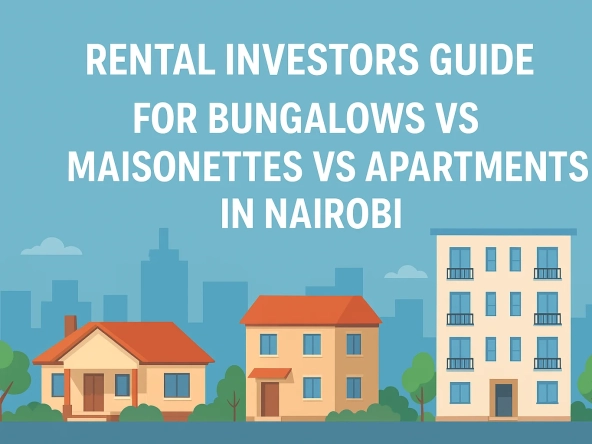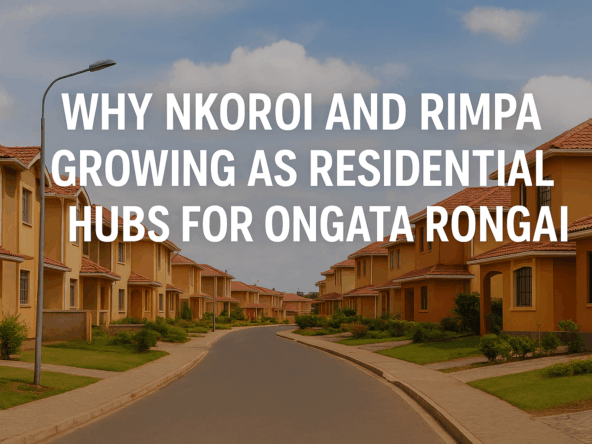Whether you’re looking to buy, sell, rent, or lease property in Nairobi, a skilled and reliable real estate agent can help you navigate the city’s bustling and competitive real estate market.
Nairobi is a growing city with diverse neighborhoods, property types, and investment opportunities, but finding a good real estate agent requires some thought and research.
Here’s a guide to help you find a reputable agent who can make your real estate journey smoother and more successful.
1. Understand what you Need from a Real Estate Agent

Before you begin your search for a real estate agent, it’s important to understand your needs.
Are you looking to buy a home?
Rent an apartment?
Sell a property?
Or perhaps you’re an investor interested in commercial properties?
Different agents may specialize in different types of properties, so identifying your needs will help you find the best agent for the job.
- For Buyers: You may need an agent who has in-depth knowledge of the current property listings and the best investment opportunities.
- For Sellers: You’ll want an agent with a strong network and experience in pricing, marketing, and negotiating to get you the best deal.
- For Renters: Look for agents who specialize in residential properties and have access to a wide range of listings.
- For Investors: Seek an agent with expertise in the commercial real estate market and the potential for high returns.
2. Conduct Thorough Research
The first step in finding a good real estate agent in Nairobi is to do some research. You can start by asking for recommendations from friends, family, or colleagues who have worked with agents in the past.
Alternatively, search online through real estate websites and directories that list professionals in Nairobi. Websites like Property24, Jumia House, and BuyRentKenya often feature agents and agencies that specialize in different property markets.
Additionally, explore social media platforms like LinkedIn, Facebook, and Instagram, where many real estate agents and agencies have profiles and post listings, providing you with a sense of their work and expertise.
Don’t forget to check their websites for customer testimonials, experience, and credentials.
3. Look for Local Expertise

Real estate agents who are well-versed in the local market will have a deeper understanding of Nairobi’s property landscape.
They will know which neighborhoods are experiencing growth, which areas are safest, and which have the best value for money.
Nairobi is made up of diverse areas, each with unique features and price points, so it’s invaluable to work with an agent who has specific knowledge of the neighborhoods you’re interested in.
Some of Nairobi’s most popular residential areas include:
- Karen and Lang’ata: Known for luxurious properties and leafy, quiet surroundings.
- Westlands and Lavington: Popular among young professionals for apartments and commercial properties.
- Kilimani and Kilileshwa: Areas that offer a mix of rental properties and investments.
- Eastlands: Affordable housing options for middle-income earners.
Make sure your agent is familiar with the neighborhood you’re interested in and has a history of successful transactions there.
4. Check Qualifications and Credentials
In Nairobi, a qualified real estate agent should be registered with a professional body like the Kenya Property Developers Association (KPDA), The Real Estate Agents’ Society of Kenya (REASK), or the Kenya National Chamber of Commerce and Industry (KNCCI).
These organizations ensure that agents adhere to ethical practices and standards.
Always ask for proof of qualifications and verify that the agent is licensed to operate within the city. This is particularly important to ensure that the agent is not only experienced but also legally allowed to handle property transactions in Kenya.
5. Evaluate their Communication Skills

A good real estate agent should be responsive and communicative. Effective communication is essential when dealing with property transactions, and an agent who is easy to reach and listens to your needs will make the entire process more enjoyable.
Pay attention to how promptly they respond to your emails, calls, or messages and whether they take the time to explain things clearly.
Transparency is also crucial—your agent should regularly update you on any new developments, including market conditions, available listings, and offers.
Avoid agents who seem evasive or avoid answering your questions. The right agent will guide you through every step of the process.
6. Assess their Experience and Track Record
An experienced agent is more likely to know how to navigate tricky situations, handle negotiations effectively, and spot potential issues with a property before they become problems.
Ask potential agents about their previous transactions and request references from past clients. Speaking to former clients will give you a better idea of the agent’s level of professionalism, communication, and expertise.
It’s important to check their success rate, the number of deals they have closed, and whether they have experience handling the type of transaction you’re pursuing.
For example, if you’re buying a property for investment purposes, you’ll want someone who understands market trends and the financial aspects of real estate investment.
7. Consider their Fees
Real estate agents in Nairobi typically charge a commission for their services. The standard commission rate is generally between 1-3 % for buying or selling properties. For rental agreements, agents may charge a fee equivalent to one month’s rent for finding a tenant.
Before engaging their services, ensure you clarify the agent’s fee structure and agree on the terms upfront.
Be cautious of agents who seem to offer unrealistically low fees or ask for large upfront payments.
An agent who offers a lower-than-average commission may cut corners in terms of service, leading to a poor experience or delayed transactions.
8. Trust your Gut

Finally, trust your instincts when choosing a real estate agent. If something feels off during your interaction with them, it’s okay to walk away.
You need someone who is not only qualified but also someone you feel comfortable with and confident in.
If an agent does not meet your expectations or fails to communicate clearly.
Can you Trust Land Brokers?
Trusting land brokers, like any other real estate broker, requires careful consideration.
While many land brokers are reputable and trustworthy, some may not have the best intentions, especially in markets where land transactions can sometimes be complex or prone to disputes.
Here’s how you can determine whether a land broker is trustworthy:
1. Check their Language
A real estate broker’s language tells a lot about their character. Legitimate land brokers should always be honest and give accurate information about the property you are looking for.
They should not switch goalposts whenever you inquire about a property. Also, they should not direct you to another property other than the one you had asked for or requested.
2. Research their Reputation and Experience
A broker with a long history of successful land deals is generally more reliable. Check online reviews, ask for client references, or get recommendations from trusted people in your network.
Brokers with a good reputation and a proven track record of handling land transactions are more likely to be trustworthy. Be cautious of brokers who are new to the market or don’t have much experience in handling land sales specifically.
3. Ensure Transparency and Honesty

A trustworthy land broker should be upfront and transparent about all aspects of the transaction. They should provide you with full details on the land, including the legal status, zoning regulations, and any potential issues (such as land disputes or unpaid land rates).
If a broker is vague or avoids giving clear answers, it could signal that they have something to hide.
4. Check for Proper Documentation
Land transactions in Kenya and many other countries require specific legal documents to verify ownership and legitimacy. A good broker should always insist on verifying the following before moving forward with any deal:
- Title Deed: Ensure that the seller has a legitimate title deed. A reputable broker should assist in verifying the authenticity of the deed through the relevant land registry.
- Land Rates/Tax Clearance: The broker should confirm that the land is free from any unpaid rates or taxes.
- Search Certificate: The broker should help you obtain a land search certificate to confirm that the seller is the rightful owner of the land.
If a broker fails to ask for or provide these essential documents, it’s a warning sign that they might not be trustworthy.
5. Avoid Brokers Who Push for Quick Deals
A trustworthy land broker will not rush you into making a decision. If a broker is pushing for a quick sale or seems overly eager to close a deal without proper due diligence, it’s a red flag.
Land transactions are significant investments, and a reputable broker will encourage you to take your time to fully understand the land’s value, legality, and potential risks.
6. Verify the Ownership of the Land
The most common issue with land transactions is disputes over land ownership. If a broker is unable to provide clear documentation proving ownership or tries to sell land with multiple claims, there is a serious risk.
Always work with a broker who insists on verifying the land’s ownership with the Land Registry and ensures there are no disputes.
7. Be Wary of Unusual Payment Arrangements
When working with a land broker, ensure that all payments are transparent, legal, and documented. Avoid brokers who request large amounts of money upfront or insist on payments to unverified accounts.
All transactions should be documented, and funds should be handled through secure, traceable means such as bank transfers.
8. Look for a Written Agreement

Once you choose to work with a broker, make sure that all agreements, including commissions and responsibilities, are put in writing. This protects both parties and ensures that everyone is clear about the terms of the deal.
If a broker is hesitant to create a written agreement or seems vague about the terms, it may be a sign that they are not trustworthy.
9. Consult a Lawyer
Before finalizing any land deal, it’s advisable to consult with a property lawyer who can help review the legal aspects of the transaction. A lawyer can assist in verifying the land’s title deed, ensure that all paperwork is in order, and help avoid potential fraud or disputes.
A reputable land broker should not be offended by this request. They should encourage you to involve a legal professional to ensure the transaction’s safety.
Conclusion
Finding a good real estate agent in Nairobi involves careful consideration, research, and trust. By following these tips, you’ll be well on your way to partnering with an agent who can provide expert advice, handle the complexities of property transactions, and help you achieve your real estate goals.
Remember, a good agent is not just someone who knows the market but someone who listens to your needs, communicates effectively, and provides guidance throughout the process.



